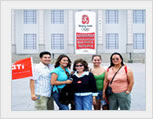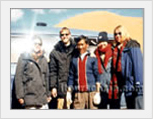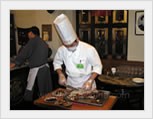
Chinese Traditional Drama
 China has a time honored tradition of dramatic arts which has evolved over 800 years and plays a very large part in Chinese culture. There are over 300 dramatic forms still thriving throughout the country. Traditional Chinese drama originated from the west, and saw its development in the earlier part of this century in Shanghai. The Traditional Drama has developed a variety of forms and performing style as well as it has shown in unique of style for a longtime. The Thunderstorm, (Leiyu, 1934), written by Cao Yu, is a full-length modern drama featuring the complicated relationships among the members and servants of a large well-off family and the family's disintegration as a result of the morbidity and corruption in old China. A example is given as one of the sons has
China has a time honored tradition of dramatic arts which has evolved over 800 years and plays a very large part in Chinese culture. There are over 300 dramatic forms still thriving throughout the country. Traditional Chinese drama originated from the west, and saw its development in the earlier part of this century in Shanghai. The Traditional Drama has developed a variety of forms and performing style as well as it has shown in unique of style for a longtime. The Thunderstorm, (Leiyu, 1934), written by Cao Yu, is a full-length modern drama featuring the complicated relationships among the members and servants of a large well-off family and the family's disintegration as a result of the morbidity and corruption in old China. A example is given as one of the sons has
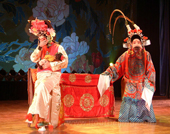 an affair with a maid, who bears him two sons.Unfortunately, modern Chinese playwrights and performers have to fight hard to attract viewers away from pop music concerts, variety shows and television programs. Death of a Famous Opera Performer, (Mingyou Zhi Si, 1929) was written by Tian Han, one of the great playwrights in modern China. In general, Traditional Chinese drama is comparatively weak in the logical development of plot and in the delineation of character. Great stress, however, is laid upon verbal decoration and poetical ornament. There are pleasing contrasts between parallel scenes, and parallelism of language, as in the Psalms. In many passages a single word is played with, compounds being made upon the root, so that a speech in praise of a
an affair with a maid, who bears him two sons.Unfortunately, modern Chinese playwrights and performers have to fight hard to attract viewers away from pop music concerts, variety shows and television programs. Death of a Famous Opera Performer, (Mingyou Zhi Si, 1929) was written by Tian Han, one of the great playwrights in modern China. In general, Traditional Chinese drama is comparatively weak in the logical development of plot and in the delineation of character. Great stress, however, is laid upon verbal decoration and poetical ornament. There are pleasing contrasts between parallel scenes, and parallelism of language, as in the Psalms. In many passages a single word is played with, compounds being made upon the root, so that a speech in praise of a
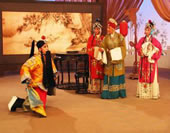 flower or of a royal person becomes an intricate linguistic labyrinth, like an English acrostic or anagram. Traditional Chinese drama aims to simulate reality and create art mainly through dialogue, physical movements and settings. Although these are considered western ideas, it holds a close and intrinsic relationship with traditional Chinese art in terms of artistic spirit embodied in traditional Chinese art and literature. Today, after nearly one hundred years of development, Chinese drama has grown up as a major dramatic art form with national influence.
flower or of a royal person becomes an intricate linguistic labyrinth, like an English acrostic or anagram. Traditional Chinese drama aims to simulate reality and create art mainly through dialogue, physical movements and settings. Although these are considered western ideas, it holds a close and intrinsic relationship with traditional Chinese art in terms of artistic spirit embodied in traditional Chinese art and literature. Today, after nearly one hundred years of development, Chinese drama has grown up as a major dramatic art form with national influence.
Your Question & Quick Answer*We welcome and appreciate your questions & reviews
User Comments
Booking Procedures | Terms & Conditions | Payment Methods | Links | Site Map | About Us | Contact Us | Travel Agent
Copyright 2008, All rights reserved.. itourbeijing.com ,china culture, china introduction
TEL: 86-10-85711972 (Universal) 1-888-288-9328 (North America) E-mail: contact@itourbeijng.com
Home | China Tours | Beijing Tours | Tibet Tours | China Travel | Beijing Travel | Shanghai Travel
